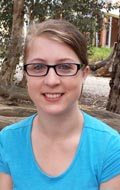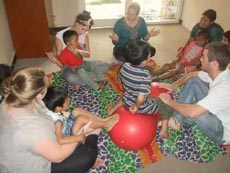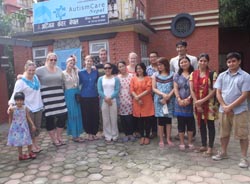Prepare for a challenge
Author: Wes Ward
Publication Date: Sunday, 22 Sep 2013
Occupational therapy student Ms Meghan Cottle knew her final placement would be challenging, but she was surprised at how much her professional confidence grew in the heat of Kathmandu, the capital of Nepal.
 Ms Cottle, who is studying at Charles Sturt University (CSU), was looking to challenge herself professionally and personally, and enjoy her first trip overseas.
Ms Cottle, who is studying at Charles Sturt University (CSU), was looking to challenge herself professionally and personally, and enjoy her first trip overseas.But little did she know the placement would teach her so much about her chosen profession, and herself.
Ms Cottle joined another occupational therapy (OT) student and two speech pathology students from CSU for a six week professional placement with Autism Care Nepal, a non-government organisation based in the capital, Kathmandu, in July and August 2013.
"Autism Care Nepal was pretty unique – it wasn't a school as such," Ms Cottle said. "We were based in a couple of buildings with the children, their mothers and their teachers. The children were separated by age and the severity of their autism, and placed in groups with four children.
 "During our time there, we took them through various activities that taught them communication and behaviour strategies. I was based in a classroom with children and their mothers undertaking a 12 week course. They were from all over Nepal, with some from Japan and India.
"During our time there, we took them through various activities that taught them communication and behaviour strategies. I was based in a classroom with children and their mothers undertaking a 12 week course. They were from all over Nepal, with some from Japan and India."The course aimed to train the mothers to understand autism and how to best communicate with their child and teach the kids how to play, which is an important skill to learn as they grow into other skills later in life."
Working with different people
Ms Cottle was surprised by the experience of working in a different culture.
"It's very eye opening, I had never been overseas before. I was amazed being in a different environment how quickly you can adapt to where you are," she said.
"And the Nepali people were so welcoming and friendly. That makes it easier."
 Ms Cottle was not ready, however, to be placed on a pedestal. "Initially, as a white Western person, they took our words as 'gospel', which was not what we wanted to do. We didn't want to take over and tell them what to do, because we are just students ourselves," she said.
Ms Cottle was not ready, however, to be placed on a pedestal. "Initially, as a white Western person, they took our words as 'gospel', which was not what we wanted to do. We didn't want to take over and tell them what to do, because we are just students ourselves," she said."But I think towards the end we developed more of a partnership, which was very beneficial for both of us. I don't think they realised what we learnt from them far outweighed what they learnt from us."
Ms Cottle also enjoyed the interaction with speech pathologist students, especially their different take on autism.
"I really didn't know much about the speech pathology course and what they do with autism, so to work so closely with them was really good," she said. "They were so skilful and confident in what they were doing – to sit back and look at what they were doing taught me a lot."
Benefits for professional development
Ms Cottle was surprised at what she personally gained from the placement in Nepal, especially in her professional development.
"The placement enabled me to develop my self-confidence, work independently and take the lead. At the start I was not good at that, but by the end I had definitely improved which I really value. I didn't expect this - I thought there would be more clinical stuff," Ms Cottle said.
"I would recommend the experience to absolutely anyone, but you should go knowing what to expect.
"If you're a very academic type of person, rather than a hands-on person, you might not be suited unless you want to become more hands-on."
All students were prepared for the international placement before they left Australia. They initially applied for three placement programs through CSU, in Vietnam and Bangladesh as well as Nepal. All students were required to go to a residential school that applied to the placement to which they were allocated.
"We had a two day training program in Sydney with Autism Spectrum Australia, or ASPECT, with training run by an occupational therapist and speech pathologist, and they trained us in specific communication and behaviour strategies for the kids and the parents," Ms Cottle said.
"We also spoke with a Nepalese occupational therapist who now works in Sydney who explained a bit about the culture and what to expect. We also got to know a bit about the other students, as we hadn't really spent much time together."
While in Nepal, the students were supervised by the OT and speech therapist from ASPECT who trained them in Sydney, as well as OT course coordinator Associate Professor Michael Curtin.
"We were always supervised, just by different disciplines, which we couldn't have done without," Ms Cottle said.
Not all work
Ms Cottle explained, however, that the trip was not all just work; "We had weekends off, so we made the most of them. We travelled to places like Chitwan National Park – we rode on elephants, were bathed by elephants, saw rhinos and did a jeep safari and other fantastic things."
Another weekend they went to Pokhara, Nepal's second largest city at the foot of the Himilayan Mountains, but poor weather stopped them from paragliding.
"We did lots of sightseeing, lots of temples, and saw a lot of Nepal in a short amount of time. We made the most of out time, but there is so much to see. I came home with about 2 500 photos!" she said.
Prepare for the challenge
Ms Cottle was adamant students need to prepare themselves for overseas placements; "Academically it has pressure. I had an assignment when I got back, and I know the speech pathology students did assignments while they were in Nepal. It's an academic challenge.
"But if you want to be challenged more than you are in Australia, then go for your life because you won't find this kind of experience in Australia. As challenging as placements in Australia are, this was just another level."
Ms Cottle is now in her final months of study at CSU, before hopefully graduating in December this year.
"This trip capped off my time at CSU," she said. "Now I hope to apply all the skills I've gained to my occupational therapy career in Australia, and can't wait for my next international experience."
ends
Media contact: Wes Ward, (02) 6051 9906
Media Note:
Contact CSU Media to arrange interviews with CSU occupational therapy student Ms Meghan Cottle and her course supervisor, Associate Professor Michael Curtin with the School of Community Health, at CSU in Albury-Wodonga.
